The effects of isolation in a time of crisis can be overpowering, but many have found companionship in their family and pets. Others have reached out a hand to foster an animal.
Michigan State University student Kelly Leary noticed shelters and nonprofits had lost their volunteers due to the shutdown.
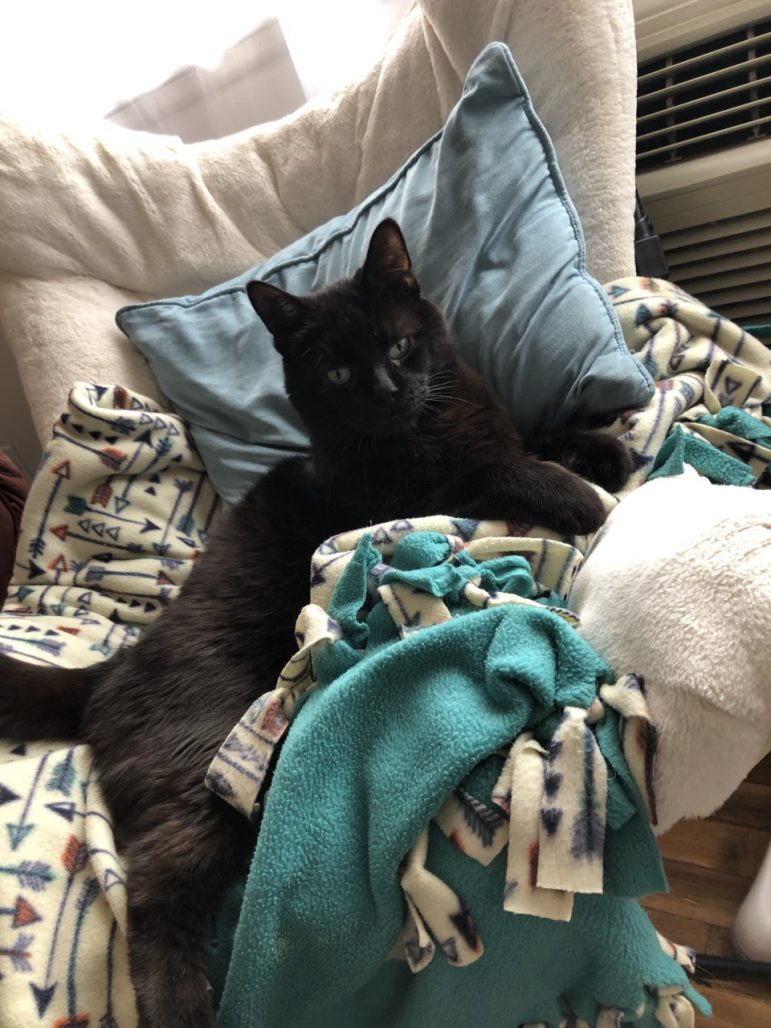
Kelly Leary
Kelly Leary’s foster cat, FlashLeary found herself lonely after her apartment roommates had left for their permanent residences, so she decided to foster Flash, a 20-pound, 8-year-old cat.
“My mental health has improved. Before fostering I was very lonely and had cabin fever,” Kelly said. “I am an extroverted person, so it has been hard being in my apartment by myself.”
Flash, nicknamed Thickcums, had surgery recently after being rescued on the side of a road, Kelly said, describing him as a dog-cat; chill, talkative, outgoing and super affectionate.
“Me and Flash are both here for each other during these times,” Leary said, “If anything, fostering Flash has helped me get into more of a routine because I am now responsible for the cat’s health and well-being. Since the lockdown, a routine has been pretty much non-existent before fostering, so it is nice to have some structure and balance back in my life.”
Across campus, Michigan State students Shannon Leary and her roommate, Nora Olandea, decided to foster after a friend that volunteers at a shelter mentioned they were looking for more foster homes due to the coronavirus.
Shannon and Nora opened their apartment to a 6-month-old cat named Buster from Ingham County Animal Control and Shelter.
“At first, when Buster came home to our apartment, he was very shy and anxious,” Shannon Leary said. “He has made so much progress since the first day he got here and he shows us that every day. Now when we pet him it takes him about 10 seconds to start purring loud enough to be heard from the next room.”
For Shannon Leary and Olandea, watching Buster break out of his shell and find his confidence has made them feel they are helping him be the cat he was meant to be while bringing happiness into their apartment.
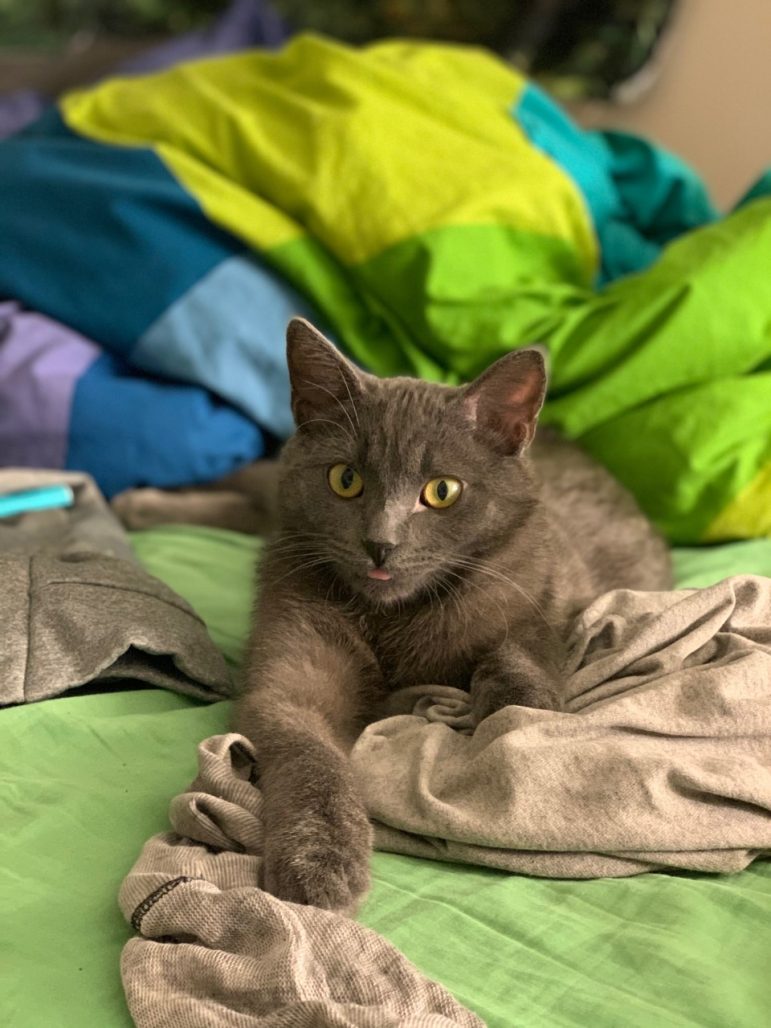
Shannon Leary
Shannon Leary and Olandea’s foster cat, Buster“I think my emotional and mental health has greatly increased. The quarantine has definitely been something that has affected everyone’s lifestyle.”
Buster has pushed Shannon Leary and Olandea to get out of bed in the morning to feed and give him his medicine, helping the roommates get an earlier start to their days.
“We couldn’t imagine going through this without him or him spending all this time in a cage, said Shannon Leary. “We are so thankful and blessed that we could help the shelter, and Buster, just as much as they have helped us.
Many of those who have pets or have decided to foster during the quarantine have felt the effects of their pets and fosters that have given them routines and companionship.
Dr. Maria Iliopoulou, the veterinarian for St. Francis Veterinary Housecall Services, said people who own or foster pets often feel less lonely or depressed.

Dr. Maria Iliopoulou
Dr. Maria Iliopoulou and her dogs, Baba (left) and Rocky (right)“In times of isolation and uncertainty, pets give us a sense of purpose and responsibility,” said Iliopoulou. “When it seems that things are spinning out of control with COVID-19, helping a homeless pet (by fostering or adopting it), gives us a sense of control and offers the healing opportunity to do good in this world by saving a life.”
In many cases, people describe fostering or adopting as a mutual rescue, Iliopoulou said, for adopting a homeless pet can benefit both humans and animals.
Pets offer a range of therapeutic benefits and can help those struggling with anxiety, depression, PTSD, loneliness, stress, post-operative healing and recovery from addiction.
“Pet-owner interactions result in increasing the oxytocin levels in both pets and owners,” Iliopoulou said. “Oxytocin is a hormone whose many functions include stimulating social bonding, relaxation and stress relief.”
By encouraging play interactions and behaviors, pets help improve both mental and physical health, said Iliopoulou. “By walking a dog and spending more time in nature we are keeping our bodies and minds healthy.”
In addition to the laughter and humor pets bring into our lives, other health benefits of pet ownership include decreasing blood pressure, cholesterol and triglyceride levels, Iliopoulou said.
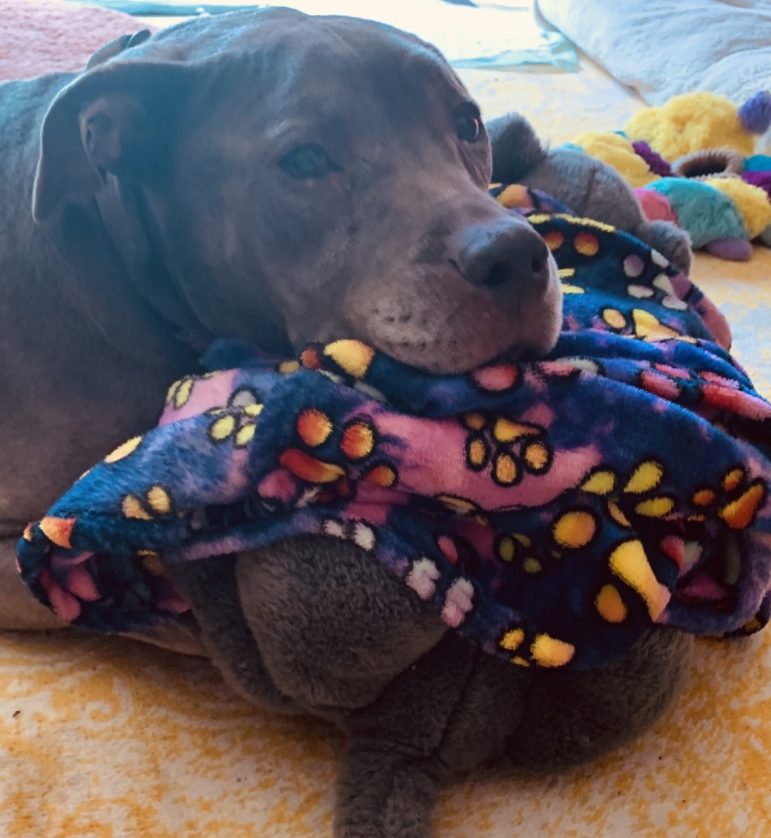
Dr. Maria Iliopoulou
Dr. Maria Iliopoulou’s dog, BabaMy pets have helped me appreciate the small things in life that are usually the most important,” said Iliopoulou. After recently losing her dog Baba, Iliopoulou recalled the impacts he had on her life.
“Baba was a pit bull type of dog that I rescued 11 years ago,” said Iliopoulou, noting that Baba had saved her life in many ways including protecting her from her ex-husband.
Even in his last days when Baba could hardly walk, “he always was very generous in showing us how much he loved us, and how grateful he was for giving him a second chance in life.”
Since Michigan’s lockdown, some apartment complexes with limits on the number of pets allowed have changed some of their rules.
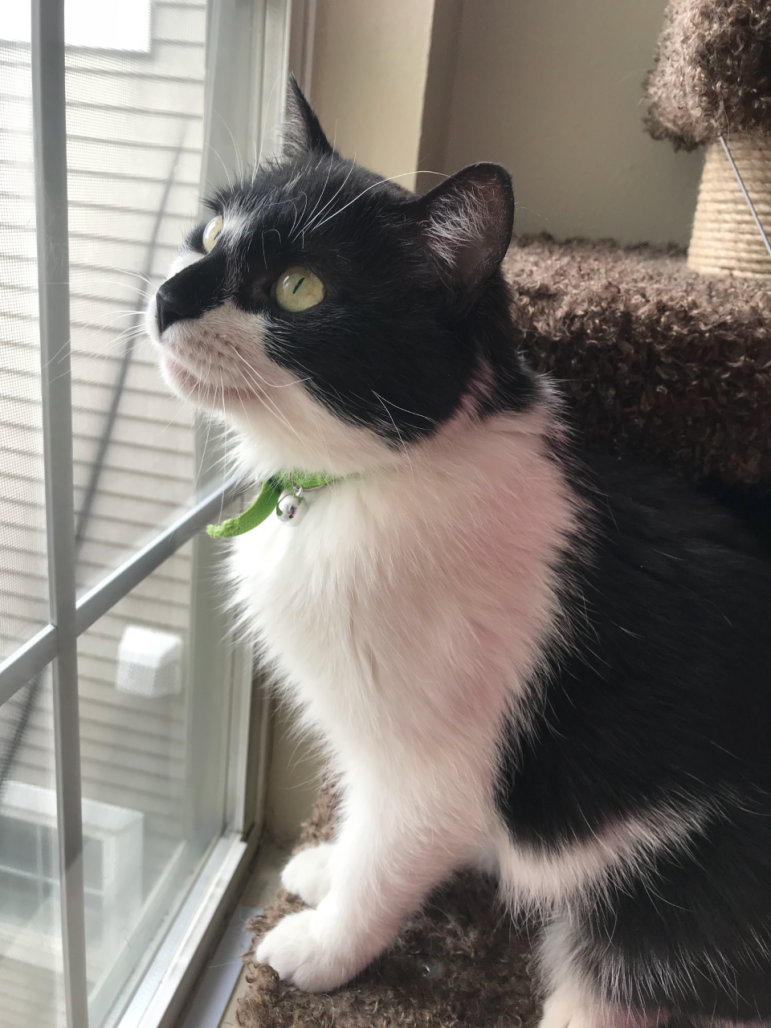
Sarah Prohaszka
Sarah Prohaszka’s foster cat, MyaSarah Prohaszka, a student at Michigan State, said her apartment granted her the opportunity to temporarily foster.
At the end of March, Prohaszka welcomed a 2-year-old cat named Mya from Ingham County Animal Control and Shelter into the apartment that she already shares with her cat, Lani.
Mya has big, expressive eyes and has the best facial expressions, Prohaszka said, “I am thrilled to share my home with her, and can’t wait to help her find her forever home.”
Although Prohaszka already had a cat to help her retain a routine, Mya has helped around the apartment in her own ways.
During her online lectures, Mya has helped keep Prohaszka focused. “She will be sleeping on my lap, and I won’t want to disturb her so I’ve become more productive with paying attention, taking notes and completing assignments.” She said. “Fostering has been so rewarding, and I highly recommend it to those who are able to try it at least once.”
Prohaszka said fostering has boosted her mood. Having a constant companion helps her feel less lonely.
Although it will be hard to say goodbye when Prohaszka finds Mya her forever home, “It makes my heart incredibly full knowing that I can give Mya a sense of security and safety until she finds her permanent home.”

Michele Schaut
Schaut’s rescue dog, Baby Girl (left) and Jesse (right) a brindle plott hound mix who is currently up for adoptionAlthough many shelters and rescues have closed, Michele’s Rescue is still open even though it is unable to use it’s volunteers since COVID-19 broke out.
Michele Schaut, in addition to being a caregiver for the elderly and caring for her mother who had a stroke last year, runs Michele’s Rescue 24/7. She cares for the sick and feral cats, newborn kittles, and rescue dogs in addition to her personal pets.

Michele Schaut
Pookie, one Schaut’s previous rescues. Has been adopted“We are currently still doing adoptions with our social distancing and extra precautions,” said Schaut, “We first start out with an application from our website getting pre-approved, and once you’re approved, you do a virtual meet and greet.”
COVID-19 has not distressed Schaut. Since the lockdown, she has become more cautious, but has made good use of the time to get a lot of things done that she had not previously.
“I am caring for animals and people 24-seven. They both bring me joy at any time. I love animals and I love people, therefore my emotional state is always good.”
Those who already have animals at home have found themselves in good company since the lockdown began.
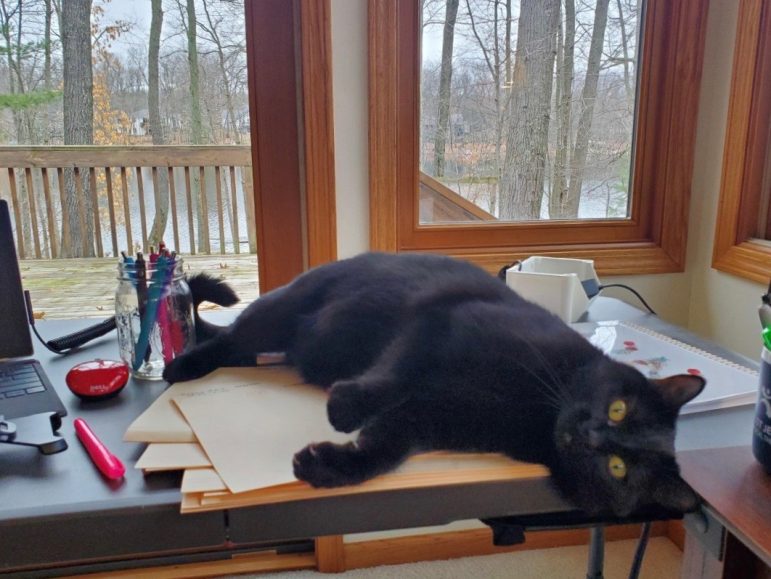
Holly Tiret
Holly Tiret’s cat, EvieHolly Tiret, a senior extension educator at Michigan State University specializing in social emotional health and wellbeing across the lifespan, has two Burmese cats and one rescue cat with her husband at home. They have kept each other company long before the quarantine began in Michigan.
“I think pets can help us whether we’re isolated or not,” Tiret said, “They add a lot of joy and happiness to our lives.”
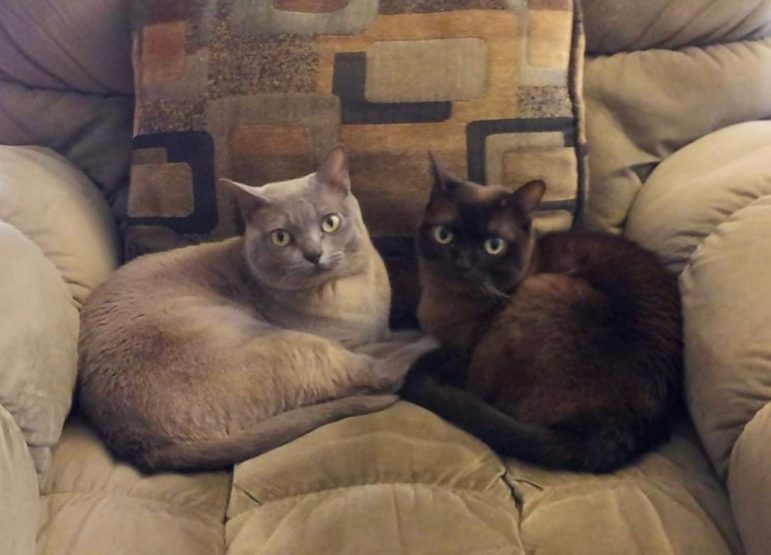
Holly Tiret
Holly Tiret’s cats Sophie (left) and Luna (right)The three cats that have provided a sense of play, laughter and humor in their house. “They have their little personalities and crazy things they do around the house,” she said.
On Tiret’s zoom calls, her cat Sophie can be seen walking back and forth past the camera.
Sophie especially, is a lap cat.
“She has to be next to me. She sleeps next to me all the time. And if i sit down, she has to be in my lap,” Tiret said, “They’re like therapy cats. You don’t think of cats as therapy animals, but they really are.”
Animals have a way of bringing comfort in uncertain times, and many people have reached out a hand and opened their homes.
If opening your home is not an option, there are plenty of other ways to help your local shelter or rescue. Many are open to monetary, food, or supply donations (see below.) Another helpful, free option is sharing local shelters’ social media posts and helping their pages reach more eyes.
Links to donate:
- Capital Area Humane Society is looking for masks for volunteers and dry food: CAHS Lansing Facebook
- Call your local pet supply store to see how you can help